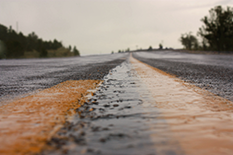
|
 |
"Rainy November" by Jessica Neuwerth is licenced under CC BY-NC-ND 2.0 |
|
Environmental engineers at the University of Maryland (UMD) will spend the next four years scrutinizing the pollution and erosion reduction capabilities of seeded compost applied along highway embankments. Funded with a $500,000 grant through the Transportation Research Board’s National Cooperative Highway Research Program, their findings could empower transportation officials nationwide to more effectively manage stormwater runoff while also making use of composted leaf and grass byproducts.
The flow of water off highways—along with the sediment, nutrients, and heavy metals it carries—are commonly managed with structural controls like retention ponds and trenches. Heavily-engineered systems can be costly and difficult to maintain, though, and often do little to improve water quality. And the effectiveness of vegetated buffer strips, a common non-structural control, shifts depending on climate, soil type, and other site characteristics.
“There are millions of miles of highways in the United States, and state departments of transportation are facing increasingly stringent water quality standards,” said Allen P. Davis, a professor in UMD’s Department of Civil and Environmental Engineering (CEE) and the Charles A. Irish Sr. Chair in Civil Engineering. “We need methods that are both efficient and cost effective if we are going to successfully manage the stormwater from our nation’s highway system.”
Davis and CEE professor Ahmet Aydilek will partner with College of Agriculture and Natural Resources professor Gary Felton to determine if vegetated compost blankets—a layer of composted material applied loosely over soil—can fill this need. Additional partners include the Low Impact Development Center, Assedo Consulting, the Washington Suburban Sanitary Commission Analytical Laboratory, and the Maryland State Highway Administration (Maryland SHA).
Beginning in fall 2017, the team will apply different compost mixtures to a variety of soils and slopes, watching to see if the layers of compost support plant growth and lessen embankment erosion caused by water rushing off the roadway.
Davis, Aydilek, and Felton will then judge how well the vegetated blankets absorb water and filter out pollutants under a range of simulated storm conditions. This work will be supplemented with data from a Maryland field site documenting how vegetated compost blankets perform under real-world conditions.
“State officials are very interested in finding a beneficial use for recycled byproducts, but the engineering properties need to be clearly defined before they can put them to use,” said Aydilek. “If we can define these properties and demonstrate that it works in the field, states can begin to adopt the practice where it makes sense.”
In addition to defining the stormwater management properties of the composted materials, Davis and Aydilek will compose construction specifications, standards, and a decision matrix that transportation officials can rely on when designing and installing vegetated compost blankets.
This National Cooperative Highway Research Program project—selected from a pool of 12 project proposals nationwide—builds on field research already underway by Davis and Aydilek. As part of an effort funded by Maryland SHA, they have been examining compost applications along Maryland highways to determine if they effectively reduce erosion and sedimentation since August of last year.
Related Articles:
MTI Announces Seed Grant Awardees
New Funding Opportunity for MTI Faculty Affiliates
Better, More Reliable Transportation Statistics
Smart signals, safer intersections
Prince George’s County Stormwater Collaboration Taps Recycled Material to Safeguard Chesapeake Bay
CEE-Led Research Featured in ES&E Magazine
UMD Awarded $1.4 Million to Design New Treatment for PCBs, Heavy Metals in Stormwater
UMD, USDA Partnership Puts Student Research Into Action
UMD to Launch Maryland Transportation Institute
Yao, Yang Receive Education Award from the American Chemical Society Division of Agrochemicals
February 22, 2017
|

